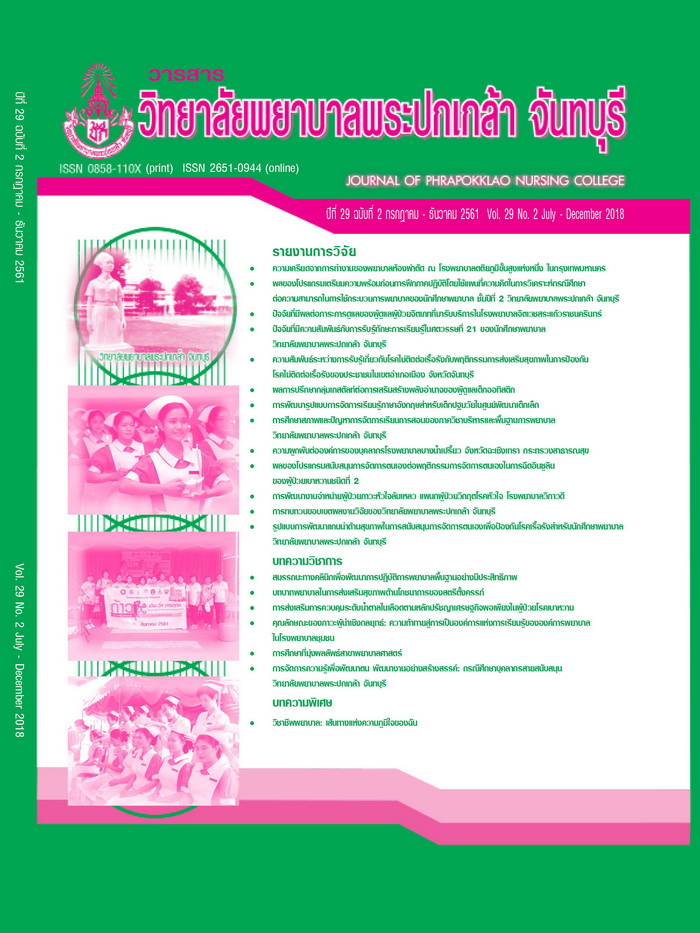The Effects of Self-management Supporting Program on Self-management Behaviors in Insulin Injection among Type 2 Diabetic Patients
Keywords:
Self-management supporting program, Self-management behavior, Insulin injection, Type 2 diabetic patientsAbstract
This quasi-experimental research aimed to examine the effects of self-management supporting program on self-management behaviors in insulin injection among type 2 diabetic patients. The samples consisted of 26 type 2 diabetic patients receiving services at Chanthanimit Tambon Health Promoting Hospital and Khao Sukim Hospital. The research instruments included a self-management supporting program, a questionnaire of individual characteristics, an assessment form of self-management behaviors in insulin injection with the reliability of .77, and a recording form of level of blood glucose. The implementation and data collection were conducted from October to December, 2016. Statistics used for data analysis included frequency, percentage, mean, standard deviation, and paired t-test.
The research results revealed that after receiving the self-management supporting program, the diabetic patients had statistically significant higher mean score of self-management behaviors in insulin injection and lower mean of level of blood glucose than before receiving the program (t = 5.650, p < .001 and t = 4.224, p < .001, respectively).
This research suggests that the health care providers should use this program to encourage proper self-management of insulin injection for type 2 diabetic patients in other diabetic clinics
References
ทัศนีย์ ขันทอง, แสงอรุณ อิสระมาลัย, และพัชรี คมจักรพันธุ์. (2556). ผลของโปรแกรมสนับสนุนการจัดการตนเองต่อพฤติกรรมการจัดการตนเองและระดับน้ำตาลในเลือดในผู้ป่วยเบาหวานชนิดที่ 2 ที่ใช้อินซูลิน. วารสารสภาการพยาบาล, 28(1), 85-99.
สมาคมโรคเบาหวานแห่งประเทศไทย. (2559). คำแนะนำการฉีดยาเบาหวาน สำหรับบุคลาการทางการแพทย์ (พิมพ์ครั้งที่ 2). กรุงเทพฯ: คอนเซ็พท์ เมดิคัส.
อมรา ทองหงษ์, กมลชนก เทพสิทธา, และภาคภูมิ จงพิริยะอนันต์. (2555). รายงานการเฝ้าระวังโรคไม่ติดต่อเรื้อรัง พ.ศ. 2555. สืบค้นจาก http://www.boe.moph.go.th/files/report/20140109_40197220.pdf (1/01/2559)
Cramer, J. A., & Pugh, M. J. (2005). The influence of insulin use on glycemic control: How well do adults follow prescriptions for insulin?. Diabetes Care, 28(1), 78-83. Retrieved from https://www.ncbi.nlm.nih.gov/pubmed/15616237
Deng, K., Ren, Y., Luo, Z., Du, K., Zhang, X., & Zhang, Q. (2016). Peer support training improved the glycemic control, insulin management, and diabetic behaviors of patients with type 2 diabetes in rural communities of central China: A randomized controlled trial. Medical Science Monitor, 22, 267-275.
Farsaei, S., Radfar, M., Heydari, Z., Abbasi, F, & Qorbani, M. (2014). Insulin adherence in patients with diabetes: Risk factors for injection omission. Primary Care Diabetes, 8(4), 338-345.
Faul, F., Erdfelder, E., Lang, A. G., & Buchner, A. (2007). G*Power 3: A flexible statistical power analysis program for the social behavioral, and biomedical sciences. Behavior Research Methods, 39(2), 175-191.
Glasgow, R. E., Davis, C. L., Funnell, M. M., & Beck, A. (2003). Implementing practical interventions to support chronic illness self-management. The Joint Commission Journal on Quality and Patient Safety, 29(11), 563-574. Retrieved from https://www.ncbi.nlm.nih.gov/pubmed/14619349
Norris, S. L., Lau, J., Smith, S. J., Schmid, C. H., & Engelgau, M. M. (2002). Self-management education for adults with type 2 diabetes: A meta-analysis of the effect on glycemic control. Diabetes Care, 25(7), 1159-1171.
Peyrot, M., Rubin, R. R., Kruger, D. F., & Travis, L. B. (2010). Correlates of insulin injection omission. Diabetes Care, 33(2), 240-245. doi:10.2337/dc09-1348
Powers, M. A., Bardsley, J., Cypress, M., Duker, P., Funnell, M. M., Fischl, A. H., … Vivian, E. (2016). Diabetes self-management education and support in type 2 diabetes: A Joint Position Statement of the American Diabetes Association, the American Association of Diabetes Educators, and the Academy of Nutrition and Dietetics. Clinical Diabetes, 34(2),70-80.
Siminerio, L. M. (2009). Models for diabetes education. In K. Weinger & C. A. Carver (Eds.), Educating your patient with diabetes (pp. 29-44). New York: Humana Press.
Trief, P. M., Cibula, D., Rodriguez, E., Akel, B., & Weinstock, R. S. (2016). Incorrect insulin administration: A problem that warrants attention. Clinical Diabetes, 34(1), 25-33. doi:10.2337/diaclin.34.1.25
Wong, S., Lee, J., Ko, Y., Chong, M. F., Lam, C. K., & Tang, W. E. (2011). Perceptions of insulin therapy amongst Asian patients with diabetes in Singapore. Diabetic Medicine, 28(2), 206-211. doi:10.1111/j.1464-5491.2010.03195.x
Yamauchi, K. (2009). Analysis of issues of insulin self-injection in elderly. Nihon Ronen Igakkai Zasshi, 46(6), 537-540. Retrieved from https://www.ncbi.nlm.nih.gov/pubmed/20139650
Downloads
Published
How to Cite
Issue
Section
License
Copyright (c) 2018 JOURNAL OF PHRAPOKKLAO NURSING COLLEGE

This work is licensed under a Creative Commons Attribution-NonCommercial-NoDerivatives 4.0 International License.
เนื้อความ ข้อมูล และรายการอ้างอิงที่ผู้เขียนใช้ในการเขียนบทความเพื่อลงตีพิมพ์ในวารสารวิทยาลัยพยาบาลพระปกเกล้า จันทบุรี ถือเป็นความคิดเห็นและความรับผิดชอบของผู้เขียน คณะผู้จัดทำวารสารไม่จำเป็นต้องเห็นพ้องด้วยหรือร่วมรับผิดชอบ
บทความที่ได้รับการลงตีพิมพ์ในวารสารวิทยาลัยพยาบาลพระปกเกล้า จันทบุรี ถือเป็นลิขสิทธิ์ของวารสารวิทยาลัยพยาบาลพระปกเกล้า จันทบุรี หากหน่วยงานหรือบุคคลใดต้องการนำส่วนหนึ่งหรือทั้งหมดของบทความไปเผยแพร่ต่อเพื่อวัตถุประสงค์ใด ๆ จะต้องได้รับอนุญาตจากบรรณาธิการวารสารก่อน



